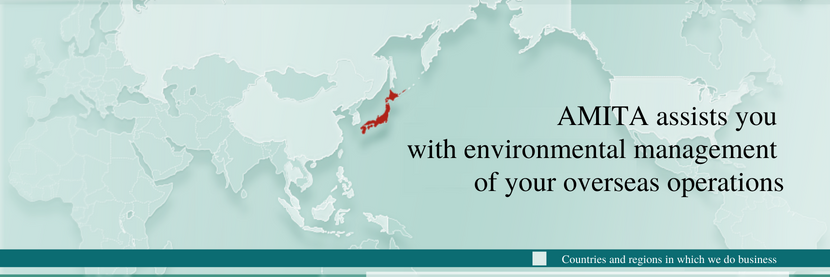
Consulting on Environmental Management
for Overseas Operations
AMITA has been in the environmental solutions business in many parts of the world since the 1980s. To be effective in environmental management of overseas operations, it is essential to be intimately familiar with local laws and regulations, international protocols such as the Basel Convention, and cross-border trading, as well as local business practices, market conditions, and culture. It is also critical to have the knowledge and expertise to choose the right waste service provider that complies with local waste management regulations.
AMITA leverages its wealth of experience and expertise, as well as a vast network of business partners, to assist you with environmental management of your overseas operations.
Our overseas environmental solutions business
 Taiwan
Taiwan
- Started doing business in the late 1980s.
- Recycle 60,000 metric tons of industrial waste into usable resources annually.
- Obtained a local patent for SlurMix®.
- Established a local affiliate in 2011.
 South Korea
South Korea
- Started doing business in 1990.
- Recycle 60,000 metric tons of industrial waste into usable resources annually.
- Obtained a local patent for SlurMix®.
- Office manned by locally hired staff.
 Russia
Russia
- Started doing business in 2004 to recycle by-products as usable resources.
 Malaysia
Malaysia
- Obtained a local patent for SlurMix®.
- Won a contract with the Ministry of the Environment of Japan in 2015 for a feasibility study in Malaysia.
- Opened the AMITA NAZA Sustainable Resource Management Centre in 2017.
Other countries
We have also conducted business in the following countries : China, Indonesia, Palau, the Philippines, Singapore, Thailand, the United States and Vietnam
Our environmental solutions and consulting business for corporate clients
1. Closed-loop recycling of industrial waste into alternative cement materials and fuels in Malaysia
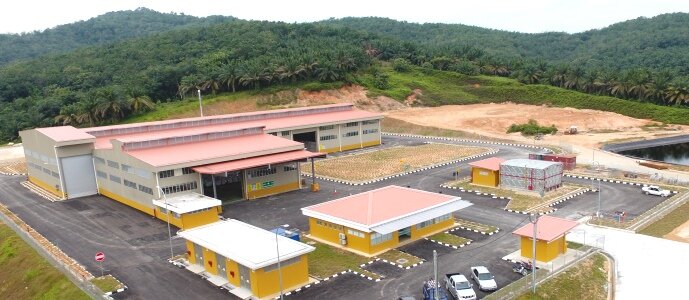
The AMITA NAZA Sustainable Resource Management Centre is operated by AMITA NAZA SDN.BHD., a joint venture between the AMITA Group and the local conglomerate NAZA Group.
The centre is authorized by the Malaysian government to recycle 14 types of scheduled industrial waste 100% into alternative cement materials and fuels, using AMITA's proprietary blending technique.
2. Importing and exporting of recycled alternative materials and fuels, matching providers with customers
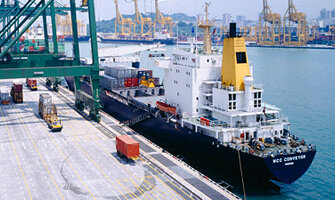
AMITA imports and exports industrial byproducts and waste, serving as a middleman between providers and customers. Our vast resource-recycling network plays an instrumental role in finding uses and customers for industrial byproducts and waste that would otherwise be discarded as useless and trading them as recycling sources for alternative materials and fuels.
- Exporting industrial byproducts and waste provided by Japanese businesses to overseas customers as recycling sources for alternative materials and fuels
- Importing industrial byproducts and waste provided by overseas businesses to customers in Japan as recycling sources for alternative materials and fuels
More specifically, we import and export industrial byproducts and waste for businesses in the following industries:
Industries to which we provide recycling sources
for alternative recycled materials and fuels
Cement, non-ferrous metals, steel, rare metals, chemicals, food additives
3. Conducting environmental risk assessments and environmental business feasibility studies of overseas operations

Overseas business operations come with risks, and so does overseas waste management. You must become familiar with local laws and regulations before starting operations.
If you intend to sell recycled materials overseas or import them from overseas, you need to understand the local market.
AMITA conducts extensive research for corporate clients into local environmental and waste management laws and regulations and local markets for recycled materials. Upon completion of research, we provide the client with a report and recommendations.
AMITA on an overseas on-site research project (pictured)
Survey case
- Research into environmental laws in Indonesia
- Feasibility study of dust management in electric furnaces in Taiwan
- Research into the effective use of coal ash in Europe
Conducting research for Japanese government agencies and municipalities
AMITA uses its recycling technologies and expertise in developing circular community models to assist developing countries in reducing GHG emissions, developing an essential infrastructure, and developing industries that make efficient use of resources. We also participate in a variety of national projects sponsored by Japanese government agencies and municipalities to use Japanese technologies to assist with the sustainable development of emerging countries.
1. Feasibility studies into assisting emerging countries with environmental management and sustainable development of industries
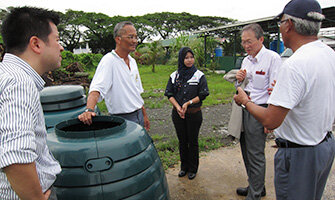
Provided that market and legal requirements are met, AMITA's proprietary closed-loop resource-recycling technologies can be effective in reducing dependence on underground resources, averting illegal dumping of industrial waste, and cutting back on GHG emissions in emerging countries. Our overseas presence can also help local businesses achieve zero emissions and reduce risks of illegal dumping of industrial waste. AMITA is working with Japanese government agencies and municipalities to conduct feasibility studies in emerging countries into the possibility of applying Japanese sustainability technologies in those countries and developing a bilateral joint crediting mechanism (JCM) to reduce GHG emissions and achieve GHG absorption.
AMITA on an overseas on-site research project (pictured)
2. Feasibility studies into applying a circular community model based on renewable energy to emerging countries
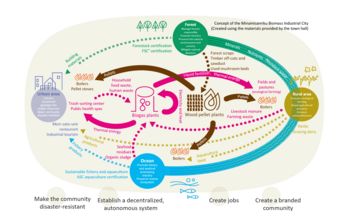
The AMITA Group has been conducting proof-of-concept field studies of developing a circular community model in Minamisanriku, Miyagi Prefecture, and Keihoku, Kyoto Prefecture. The circular model is based on our technologies for recycling food waste into usable resources and those for ecological farming. We have been working with government agencies since 2013 to conduct feasibility studies into applying this model to emerging countries as part of international collaborative efforts.
(To the right is a conceptual diagram of a circular community model developed for Minamisanriku. Click it to enlarge.)


